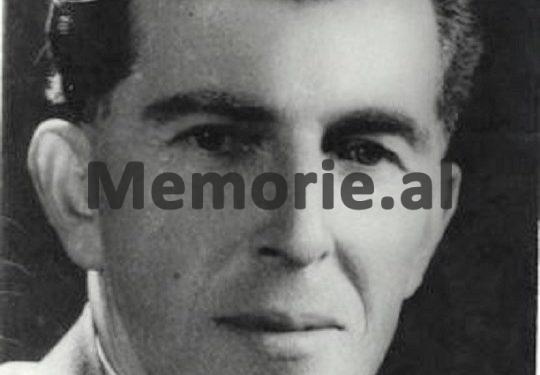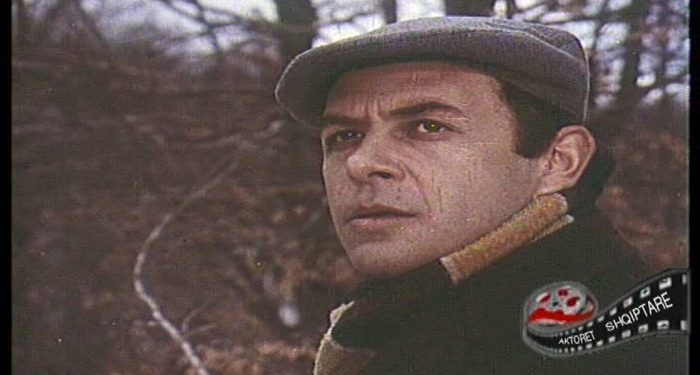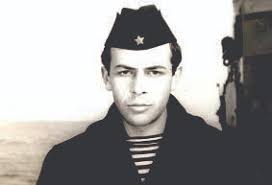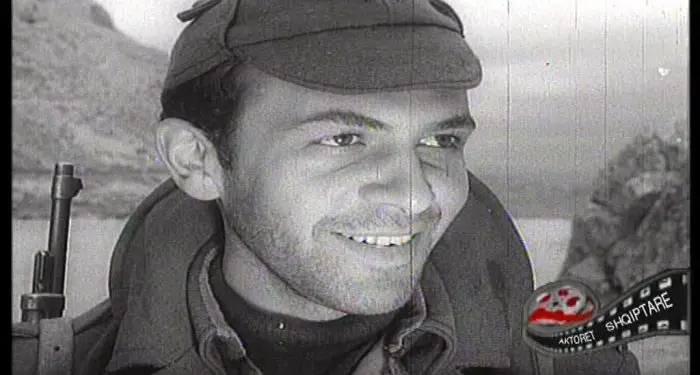“A Few Words About Rikard Ljarja”
Memorie.al / It must have been the year 1971 when various films were screened on the stretched white canvas on the side of building number three, near the area behind the “Albania Today” Exhibition. The cinema machine was everywhere in Albania, conveying the state’s ideology to the most peripheral corners of the homeland. The film I watched for the first time in an open environment was “The Commissioner of Light,” a 1966 production by the “Shqipëria e Re” Film Studio, starring the well-known actors Rikard Ljarja, Roza Anagnosti, Ndrek Luca, Liza Vorfi, Mario Ashiku, Viktor Zhusti, Ndrek Prela, and many others.
I will not dwell on the psychoanalytic argument of the spectator and the book reader, as this is not the case, but I remember that the film’s effect remained unchanged at various times until 1992. Was it the good script, the subtle direction of Viktor Gjika and Dhimitër Anagnosti, or the actors’ performance? I can’t say for sure.
Since cinema is known to be a collective art, it seems many voices came together. Here, the figure of the main hero, “Dritan of Shkabaj,” masterfully played by Rikard Ljarja, emerges right from the first minutes of the film.
The “Merited Artist” was conceived as a star of light amid the darkness, where the other actors played the negative characters with equal skill. The message of self-fulfillment reached me as a spectator, creating that immortal mummification that, luckily; only art holds the privilege for. Ultimately, the entire human being possesses wealth, power, and the wealth of their own talent, functioning towards immortality, or the longest possible memorization in the human mind.
Rikard Ljarja had won the screen test for this film at the age of 23, one year after completing his higher studies. He came from the “Migjeni” Theater in Shkodra, the city of art and sports. In this theater, one of the most reputable in Albania, he was among the most talented and experienced artists, such as; Bep Shiroka, Lec Bushati, Tano Banushi, Tinka Kurti, etc.
But the charismatic and extremely talented young man was also an instrumentalist (accordion) and was invited to all music groups in Shkodra (he was the most sought-after). And as he explained the golden age when the artistic and sports movement flourished in the Shkodra region, he stated, among other things, that “there wasn’t a child of that age who wasn’t involved in learning a musical instrument in the artistic circles of the Pioneer’s House.” This environment was, so to speak, the “humus” of other talents that Shkodra produced at the national level. The “Migjeni” Theater of that time was a school for Rikard in every sense.
Fortune smiled upon Rikard again, and he took another protagonist role as “Skënder” in the film “The Silent Duel.” The role of a sailor with a very positive psychological profile has rarely been attached to a character’s figure so fully realized in Albanian cinematography.
In the film “White Roads,” directed by Viktor Gjika and written by Vath Koreshi in 1974, he, with the role of “Deda” the wire-guard, displayed dedicated talent and the contradiction of the common man who, for the sake of work, finds himself in the city’s whirlwind, depending on a thin wire. We find this hero in world cinematography, and the actor himself did not accept the absurd, prejudicial stereotype of the “layman” in the post-1991 media. Hollywood has entire films about firefighters and forest rangers, not to mention aviators and ship captains.
Mevlan Shanaj, actor and director, states: “Rikard is the pioneer of modern Albanian cinema. He became the most communicative figure with the many Albanian viewers. Rikard helped his fate in Albanian cinematography by working with great passion, transforming his characters into models that had the power to change the present, meaning he believed in the power of cinema even under the weight of censorship.”
In the films “Conscience” and “Old Wounds,” the spirit of the modern actor is felt, with the psychological tension of an intellectual who is at the opposite pole of the characters he had created before. The spirit of European cinema is felt, well-integrated in all aspects.
In action films, such as “When a Day Dawned,” “Triumph over Death” (the most-watched film in China, North Korea, and Vietnam), “The Radio Station,” “Alleys That Sought the Sun,” and in the film “Hell ’43,” as well as “The Illegals” or “Stars of Long Nights,” the acting color of the characters perfected the sensibility in the viewer’s psychology. Rikard shines even in supporting roles.
He was one of the few actors until the 1990s who had the most roles in Albanian cinematography and was one of the country’s best-known actors, so much so that as a joke it was said: “We will eat bread either with ‘Deda’ of ‘White Roads,’ or ‘Skënder’ of ‘The Silent Duel,’ and undoubtedly with ‘Dritan of Shkabaj’ of the film ‘The Commissioner of Light.’
With his bass voice, extremely clear and resonant, and a very charming appearance, he became the icon of Albanian film. Some called him by his characters’ names, as that was the time and the respect for the artist. The film lines became a jargon of the humor of the time, and Rikard’s name was often mentioned in every environment, with his emblematic roles.
It was the era of icons, where countries like France, Italy, and Great Britain, in contrast to the American film industry, “Hollywood,” created immortal myths with actors such as; Alain Delon, Brigitte Bardot, Jean Gabin, Sophia Loren, Marcello Mastroianni, Gina Lollobrigida, Claudia Cardinale, and Alberto Sordi, Woody Allen, and many others, whom fate wished the Albanian viewer to adore, but it also increased the enthusiasm, so Albanian actors had to be of those dimensions to be able to follow them in their films.
From Actor to Director: The Slap from Prenk Jakova
Rikard displayed another talent in the directing field of film and theater. The long list begins as co-director with director Sajmir Kumbaro in the film “Alleys That Sought the Sun” and “The Illegals,” followed by his own films, such as; “When the Doors of Life Open,” “There Is Life in the Snowy Forests,” “The Radio Station,” “The Weight of Time,” “The Bridge and the Castle,” “Hell ’43,” “The End of a Blood Feud,” “Folk,” etc.
In Rikard, the child of Karlo and Angje Logoreci, the niece of the well-known Mati Logoreci, the hidden talent of the violinist and writer appeared sometimes earlier, sometimes later. As Rikard himself recalled his mother, who read books aloud to him before he even started school, “together with my sister Ernesta, I entered the world of research and silence,” he would say. For eight years of his childhood, he was inseparable from musical instruments, and often his parents envisioned Rikard’s future in the world of music, as a renowned composer or musician.
This is how he recalled the “slap” given by Prenk Jakova. And do you know why? The rules at that time, for the right to study, were based on the planning of study scholarships. Rikard won the right to attend the two-year Institute for Mathematics – Physics. His father, Karlo, with an Austrian school background, suggested he go to the Industrial Chemistry branch instead, as he was probably meant to resemble his uncle, Gaspër Ljarja, the well-known engineer of “Korça” beer, who had completed his studies in Italy.
But Rikard competed for actor at the “Aleksandër Moisiu” higher school, where he also won. During these days in Tirana, he met Prenka Jakova, who became nervous with Rikard because he hadn’t waited for the Higher Institute to open to pursue music, and gave him a slap.
The screenwriter Rikard Ljarja has a new spirit in the films “When the Doors of Life Open” and “The Weight of Time,” where he openly confronts the truth, where conservatism as a social phenomenon represents the wall that cannot be crossed without a clash of ideas and the search for reforms; he was thus preparing Albanian society for the need for change with intellectual courage.
The Transition Years and the Legacy
During these years of the prolonged Albanian transition, the most preferred actor before the 1990s would not be invited to any role in the few films made for almost 30 years. Only Mevlan Shanaj gave him a role in the film “White Pages.” Filmmaker Agim Sopi gave him a role in the film “Anathema.” He also took a role from director Ekrem Kryeziu in the film “The Victims of Tivar” in 1996. He took several roles in the theater, such as in “Migjeni” in the play “Saint John the Beheaded” and in the “Petro Marko” Vlora theater, a drama by Fadil Hysa titled “The Testament,” and continued with a staging as a director at the “National Theater” of Stefan Çapaliku’s work, titled “Utopos.”
He accepted an invitation to Kosovo, to the Pristina Theater, and immersed himself in a new drama by author Ariel Dorfman, titled “Death and the Maiden,” which centered on human rights violations.
Rikard, who had vowed to himself in his adolescence that he would become a writer, but the course of life had changed and he had his first novel, “In a Wilderness Around Here,” in his drawer, but as he said-he was shy about it, and one day his friends and colleagues encouraged him to publish it.
“I have always written notes down on paper. I wrote whatever came to mind, I have many of them because I keep them, and when I have time, I will think about them,” Rikard would say.
When I spontaneously met the writer Rikard Ljarja and we started conversations about literature, I had before me an admirable, and above all, surprising cultural dimension, because in my neighborhood, I didn’t talk to any of the more than 20 actors who lived on “Myslym Shyri” street before the 1990s; I had my conviction that you should love them according to their work, where they perform in the theater or film, but here, to our surprise, there was no residential area for actors and prominent people, and there never will be, and you encounter your myth three times a day.
Rikard, well-organized in his Albanological knowledge, with admiration for Eqrem Çabej, would amaze you. His friends, colleagues, and contemporaries tell of his subtle and witty humor, which will be long remembered. He published articles in the press of the time about the concerns of society and art.
In 2009, he published his second novel, “A Time of Dogs.” He then continued with the publication of the books; “Smoke: A Black and White Chronicle,” a prose, and the novel “Josifopedia.” Although he avoided “morbus actorum,” the profile of the famous actor identifying with his roles, it was still impossible, because as he recounted, regarding the invitation extended to him by the son of the “Hero of Socialist Labor,” the wire-guard Pjetër Llesh Deda; “I couldn’t avoid it.”
“They would feel bad if I didn’t go to his wedding.” He was greeted with honors at the head of the place, and “I had the feeling that people were looking at me as if I were Pjetri himself.” He had held his breath towards Gjirokastër, full of longing for his father’s decoration as a physics professor at the high school of the strange city. Gjirokastër had about 40 families from northern Albania within its bosom, and this colony had designated one day a year when they gathered and dined together.
His lapidary maxims about Albanians will remain unforgettable, as he wrote; “When we are loyal, we are loyal to the end-because they have trusted us.” “When we are faithless, we are faithless to the end-because they have mistrusted us.” A special race.
Rikard was very attached to his birthplace, Shkodra, so he spent part of his time in his old house, where he worked in the garden and planted flowers, but also filled his spiritual world, and would return to Tirana, writing about its history, but also sketching future literary works with exotic and surreal characters.
His life near the filming sets gave him acquaintance with his wife, actress Marjeta Ilo, with whom he enjoyed life, with the birth of their children, daughter Lorena and son Leandër.
Rikard Ljarja’s 80th birthday was an opportunity for me to show myself as one of his thousands of grateful viewers for what he gave us with his roles in cinematography and literature; the sounds of his music and the style of his painting were the privilege of another generation and a closer circle.
As Rikard himself said, although he was born on April 1, 1943, he celebrated his birthday on April 3. The building that I once saw on the stretched canvas was the coincidence that connected me to Rikard, because he came out there for the last time, never to return, heading to Shkodra, on April 20, 2020. Memorie.al
(Original Title: “A Few Words about Rikard Ljarja”)
















